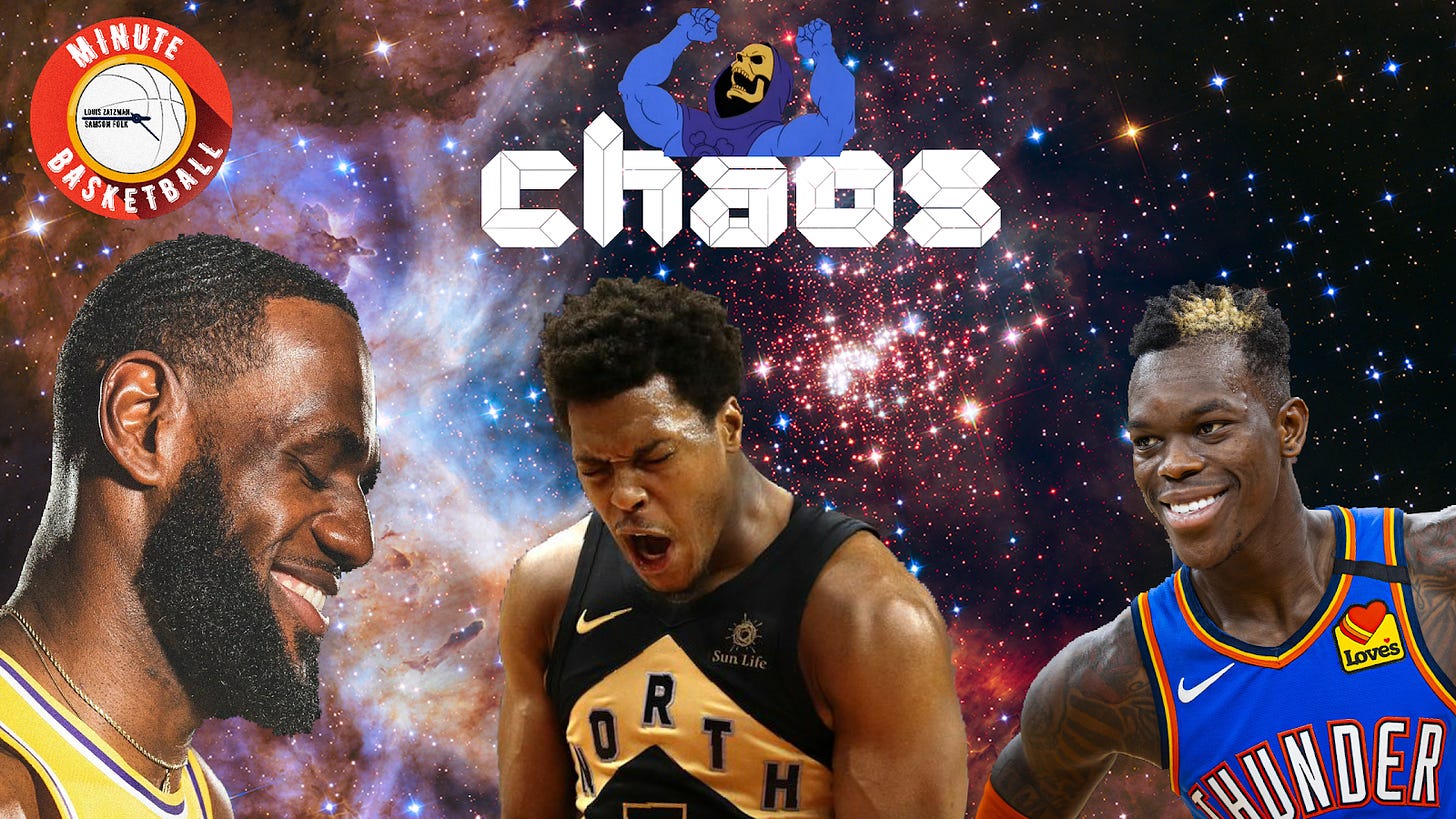
If I’ve learned anything since March 13, it’s that life is unpredictable. We all know that theoretically, of course. But the last 139 days of, mostly, unceasing and unfamiliar sameness, have hammered that lesson into my brain. Unpredictability is tangible, now. We create routine as an adaptation, a response. So basketball is back now, and with it again comes an old routine. I will try to remember that chaos runs deeper.
Some backstory. Samson Folk and I ran the Black Box Report together, but it was a little too plane crash-y, in more ways than one. We liked the idea but not the delivery, so we decided to broaden the approach and add a little more versatility.
That brings us to Minute Basketball. Minute, because every column is also available as a podcast, which should be consumable in only a short Minute or Two. Also, minute (pronounced: ‘my-newt’) because we want to get small in explicating things on the basketball court (and maybe beyond). We want to be as minute as possible because those details can help explain the inexplicable, making more transparent what puts points on the scoreboard. We look forward and back simultaneously, using the minute details to predict and explain, then analyze how we did in those predictions and explanations. This is the first ever publishing of Minute Basketball.
This, our first week, we’re talking chaos.
Looking Back - Zatzman
Changing your stripes
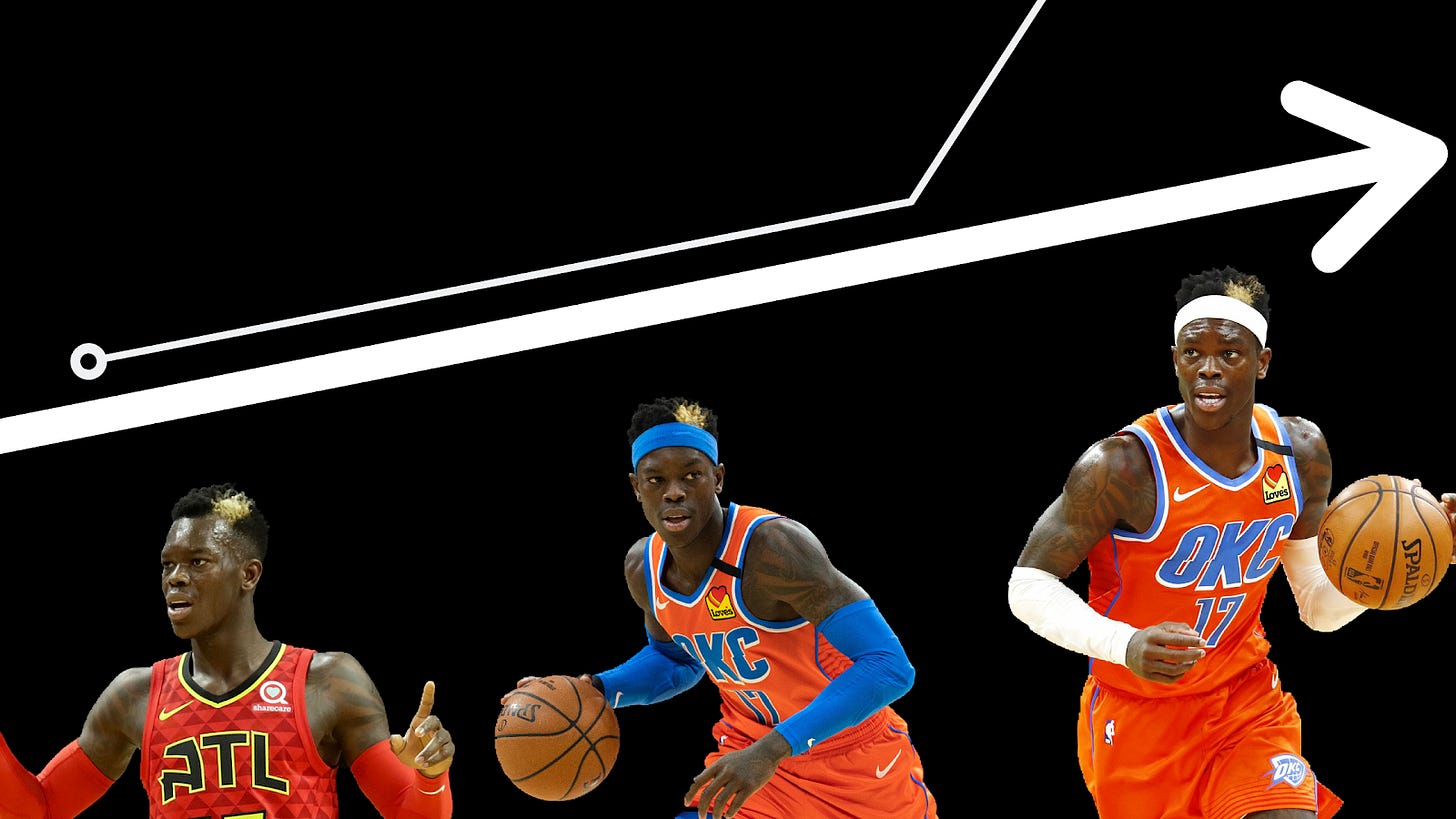
In 1945, Lancaster bombers were dropping thousands of pounds of bombs on Berlin. By 1947, the same planes were flying coal, fuel, and food to the same city. The point is that given a shift in context, condemnable can quickly become crucial.
A few years ago, Dennis Schroder was considered an offensive basketball player (in more ways than one). Quietly, though, Schroder has transformed the area in which he offers impact; defensively this year, his team was 8.4 points per 100 possessions better with him on the court. That was fourth-best in the league among players who notched a modest 1000 minutes. A big shift for a player whose presence caused his team to be worse on defense in five of his six previous seasons.
What happened?
Schroder did not become a lockdown individual defender, though his awareness, effort, and consistency when he’s on-ball did improve. Instead, the Oklahoma City Thunder unleashed him this year as an off-ball weapon alongside other guards.
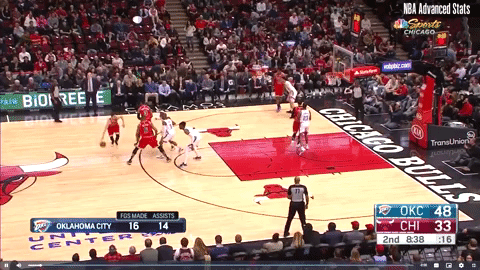
Though Schroder himself boasted a poor steal rate, lineups that included him forced opponents into far more misses and turnovers.
The Thunder adored using Schroder alongside multiple other guards. In fact, of Schroder’s 3946 non-garbage time possessions, 30.1 percent came alongside Chris Paul without Shai Gileous-Alexander, 38.3 percent alongside Gilgeous-Alexander without Paul, and 21.5 percent alongside both other guards. (Schroder played a measly 10.0 percent of his time without Paul or Gilgeous-Alexander, and the Thunder’s defense was fairly mediocre when that happened.) Playing two and even three point guards together on the defensive end can supercharge a team defense, particularly when all three have the size or strength to switch onto wings and contest shots at the rim.
The Thunder’s three-point guard lineups switched, rotated, scrambled, doubled, and generally caused havoc. The guards were empowered to play free safety, roving all over the court, and Billy Donovan trusted the small lineups to rotate any advantage into oblivion and squeeze the dimensions of the court.
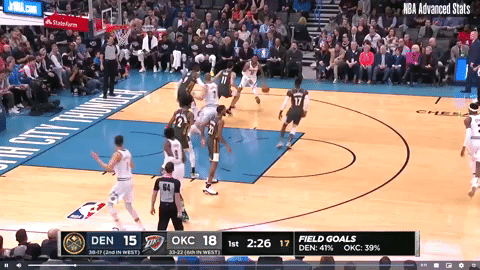
Schroder himself stole the ball three times this year by picking up full-court alone.
The Thunder have clinched a playoff spot. If they make any noise when they get there, it will be because of the defensive chaos creation that Schroder provides alongside other guards. More likely, Schroder’s presence won’t cause high-level opponents to resort to havoc offense. Playoff offenses are happy to play slow and exploit a mismatch through isolation. The Thunder will find it harder to create turnovers when that happens. But don’t worry about the future; this is about appreciating the changes in Schroder’s game, and the good that his useful brand of chaos brought the Thunder.
The Denver Nuggets
In their first Orlando Bubble Scrimmage, the Denver Nuggets started Jerami Grant, Paul Millsap, Bol Bol, Mason Plumlee, and Nikola Jokic. With all five comfortable playing center, the lineup’s average height towered at six-foot-ten. This group probably won’t play when games matter, but appreciate it now for what it is: titanic, pure, and unadulterated chaos.
Looking Forward - Folk
To use a term that should be trotted out sparingly, but due to recent events has become increasingly commonplace, we are in unprecedented times. Chaotic times, even. While life has always been a collection of things bouncing into things, reacting, and carrying on, we’ve gotten quite good (well, some people have) at normalizing our existence. I think it’s that talent for normalizing that appeals to those of us who feel a warm glow of familiarity in a resumed NBA season, even if the actual motivations for the season’s return are cold and calculated.
A death in the family brought me back to Canada.
I wasn’t received with open arms or warm embraces, but rather a mandate for 14 days in self-isolation. Don’t get me wrong: I agree with the safety precautions and am happy to sit and stew by myself in the name of public health. However (comma) it’s strange to be in the same city as my family but unable to collect on any of the benefits that close proximity usually grants. In that way, I share a bit of circumstance with NBA players - leaving home and travelling great distances to find yourself alone in a small box (for lack of a better term).
The majority of players no doubt find comfort in returning to the court and getting an opportunity to bring finality to this season. Some see this as an opportunity to be seen on a massive platform, and to use that exposure for meaningful change and influence. Some decided it wasn’t worth the risk. Regardless, real NBA basketball will recommence.
Limiting Chaos

Countless wunderkids have come and gone in the last 20 years of sport, and there has only been one LeBron James. The post-Jordan NBA salivated at the arrival of every athletic wing, ready to cast the heaviest of expectations and let them deal with the weight. A lot of these kids didn’t even make the NBA. James though, in the middle of a media storm that became his life, has been a consummate pro, a leader for several different communities, and a terrific father. Of course, he also exceeded all expectations and launched himself into the conversation for Greatest of All Time on the basketball court. The key to James' success is an insane talent level stacked on top of a cerebral game rooted in exercising control in the smallest places on the court.
The 3-1 finals comeback against the Warriors was an exercise of control the likes of which few of us have ever seen before. A game 7 where he played all but one minute of the game, and had a usage rate and assist rate of 33 percent and 47 percent, respectively. It was direct control, and that dominating aspect of his game is what makes his singular presence on a team so transformative. His presence alone makes his team an NBA Finals contender. So, in these uncertain and chaotic times, why wouldn’t we expect the master of control to exert influence on this situation, and come out on top? There’s a lot of moving parts, but James’ game and mental fortitude are resolute.
When James is at his most dominant he reduces the court to a chessboard and carefully places himself and his teammates in positions of success. Most importantly, though, his particular brand of chess only works when he’s the hand behind the board, making every decision behind the movement of every piece. The Lakers matchup hunt in the clutch, James sitting near halfcourt and calmly selecting the victim of the forthcoming possession. Nobody can emulate what James brings to the floor. That’s control. He is a singular force.
Wielding Chaos
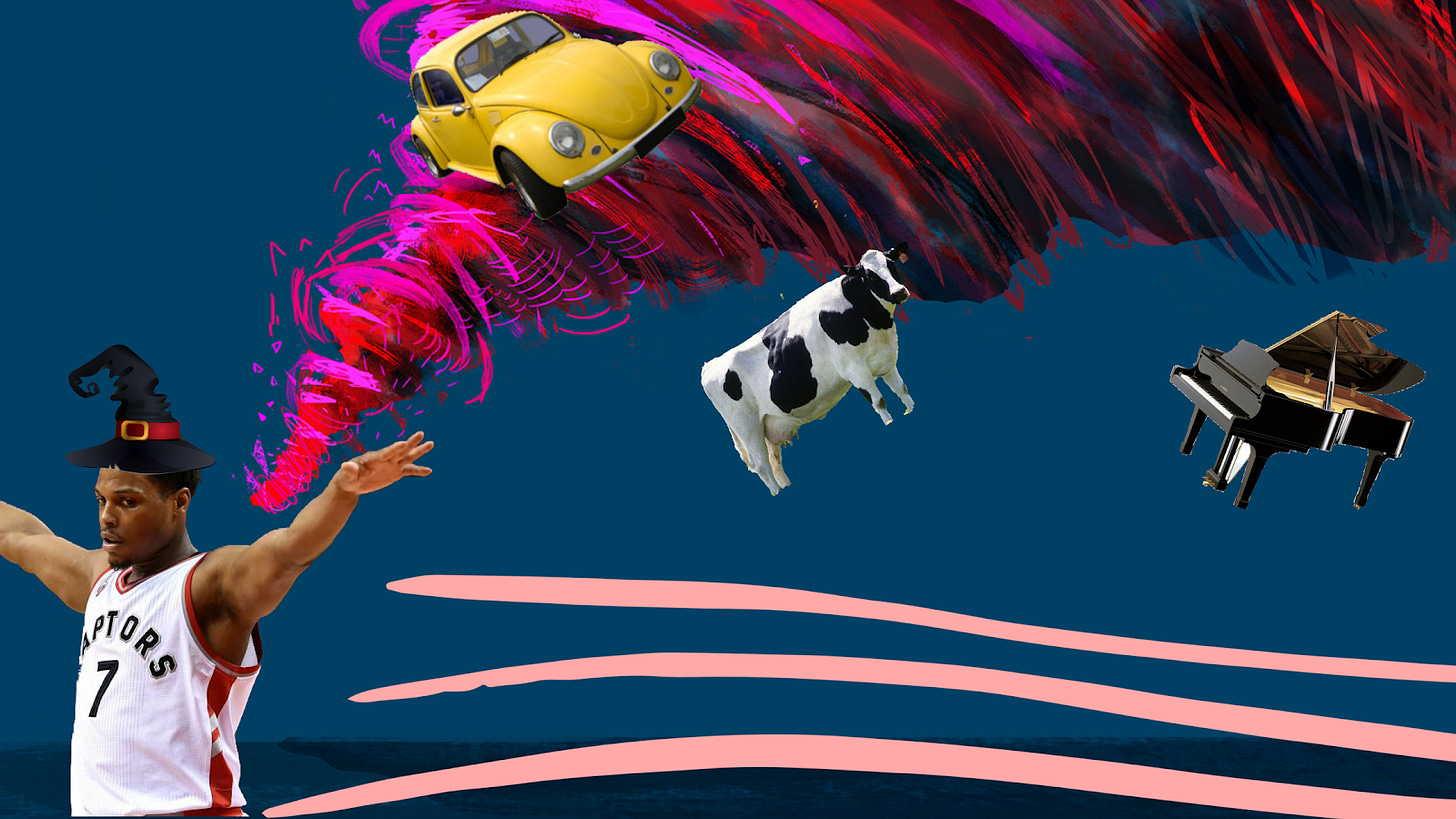
It took Kyle Lowry a long time to get here. The second act of his career equals those of some of the best point guards in the NBA, but the first act of his career - at least through a historical context - is fairly unremarkable. Why is that? Well, Lowry didn’t have the transformative talent, size, or athleticism that James did, and so his attempts at control were often rebuffed. Supplanted by Mike Conley (and won a chip with Conley’s running mate a decade later) in Memphis, traded out of Houston amid drama with the head coach, and landed in Toronto where he had no designs on staying. Now Lowry is a champion and beloved in Toronto, but what changed?
Well, instead of control, Lowry chose the route of influence. It’s clear to see from his years in Houston that Lowry was forward-thinking, and was already one of the league’s best thinkers. He just had to be able to communicate his ethos to teammates and coaches. It’s why the Raptors have unequivocally been Lowry’s team, even when Kawhi Leonard was in town. It’s why the Raptors survived Leonard’s departure and are still contenders. The performances of his teammates are part and parcel of Lowry’s own game. To think of basketball as anything other than the collective team would be the antithesis of what Lowry is about.
Led by Lowry, the Raptors don’t exhibit control or limit chaos. With Lowry directing traffic, they harness chaos. Rampant double teams defensively, and heaps of transition offensively, the Raptors embody the storm. Grand pianos, cars, and the odd cow fly around the tornado that is the Raptors on court, and with Lowry guiding the way the Raptors move through it unscathed. Most importantly, this is Lowry’s brand of basketball; he’s wanted this since he entered the league, and he’s imparted his wisdom to his teammates. So rather than Lowry being the sole possessor of this brand of basketball, the Raptors as a whole have grasped the concept. That’s influence. Lowry, too, is a singular force.
LeBron James is Poseidon. He possesses the power and control to quell the raging sea. Kyle Lowry is the shipwright whose boats weather even the worst storms. We’ll see which is more valuable in the chaotic and unfeeling restarted NBA season.





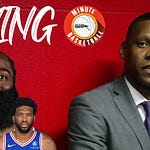



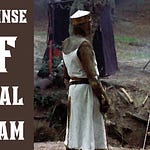


Minute Basketball: Changing your stripes and weathering the storm